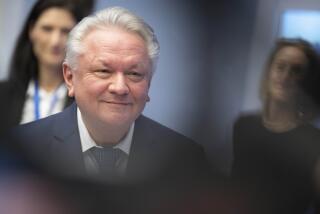Russia Mulls Options to Help U.S.
- Share via
MOSCOW — Russia is considering various forms of cooperation with the United States in a possible military assault on terrorists based in Afghanistan and is conferring with its Central Asian allies, U.S. and Russian officials said Monday.
“They have not ruled anything in or anything out,” Undersecretary of State John R. Bolton said after meeting with top Russian officials here.
Russia’s cooperation could be critical to any U.S. military action in Afghanistan. Three of Russia’s closest allies and neighbors--the former Soviet republics of Tajikistan, Uzbekistan and Turkmenistan--form Afghanistan’s northern border. Russia operates several military facilities in the region and has 10,000 troops in Tajikistan--an entire motor-rifle division and about 5,000 border guards.
As recently as Friday, top Russian officials were expressing doubts about cooperating with the United States. But that appeared to shift Monday, with President Vladimir V. Putin holding telephone talks with Central Asian leaders and dispatching his top security advisor, Security Council chief Vladimir B. Rushailo, to the region.
“We will hold consultations and negotiations . . . to discuss efforts to coordinate activities in combating terrorism,” Rushailo said.
The pace of U.S.-Russian consultations has quickened in recent days. On Wednesday, Russian Foreign Minister Igor S. Ivanov is scheduled to confer with U.S. Secretary of State Colin L. Powell in Washington, D.C.
America’s potential military action in Afghanistan puts Russia in a delicate position. A decision to cooperate with the United States would threaten its traditional friendship with a number of Muslim and Arab countries, including Iran, Iraq and Syria.
However, the Russian public appears to approve of some form of support for U.S. military action, as long as any campaign closely targets specific terrorist facilities and avoids civilian casualties.
Russian support is likely to stop short of sending in ground troops or other personnel. The Soviet Union lost 15,000 troops during its unsuccessful 10-year occupation of Afghanistan that ended in 1989, and those memories are still fresh. Moreover, Russia is currently embroiled in a military quagmire of its own, its 2-year-old war against separatists in the republic of Chechnya.
Russian officials have long blamed that insurgency on terrorists with financing from the Middle East, including Saudi exile Osama bin Laden, whom U.S. officials suspect was behind last week’s terrorist strikes. On Monday, Russia’s Federal Security Service, or FSB--the main successor agency to the Soviet-era KGB--announced that it had discovered a compact disc in a weapon cache in Chechnya that contained operational information and piloting instructions for Boeing 737 aircraft. All four aircraft that crashed last week in the U.S. were made by Boeing.
Information about the discovery has been passed to the United States and other Western intelligence agencies, an FSB spokesman said, but he did not say when the cache was discovered or when the information was provided.
“We know that the people who had it are part of the group of an Arab mercenary who has contacts with Osama bin Laden,” FSB spokesman Alexander A. Zdanovich said. “And we know that a number of rebels and representatives of Osama bin Laden have been to Chechnya and may now be in the Pankissi” Gorge, an area in Georgia bordering Chechnya.
Kremlin spokesman Sergei V. Yastrzhembsky suggested that in the past, the West has unwisely dismissed Russian intelligence warnings.
“Unfortunately, for some reasons, this information was not regarded seriously enough in the West,” he said. “Maybe it was not perceived as a direct threat to the life and safety of Western citizens.”
Undersecretary of State Bolton’s talks with Russian officials also touched on the difficult subject of U.S. plans to abrogate the 1972 Antiballistic Missile Treaty and develop a national missile defense. In Russia and elsewhere, the World Trade Center and Pentagon attacks were widely seen as proof that a national missile defense was superfluous.
But Bolton took issue with that interpretation in his talks with Russian officials.
“One of the points I made was that these horrible events to us demonstrated the validity of our concern that there were people in the world who didn’t adhere to classic notions of deterrence and whose value systems and respect for human life didn’t quite match Western standards,” Bolton said at a news conference.
As for Russia’s traditional friendship with some countries that the United States considers “rogue states,” Bolton said he warned the Russians that they have been keeping dangerous company.
“There is an essentially 100% overlap between the states that are sponsors or harborers or aiders of terrorism and states which are seeking to acquire chemical, biological or nuclear weapons and ballistic missile capabilities,” he said. “I don’t think you can seriously argue that truly addressing the question of international terrorism can be successful unless this subject of weapons of mass destruction in the hands of these people is also resolved.”
More to Read
Sign up for Essential California
The most important California stories and recommendations in your inbox every morning.
You may occasionally receive promotional content from the Los Angeles Times.













